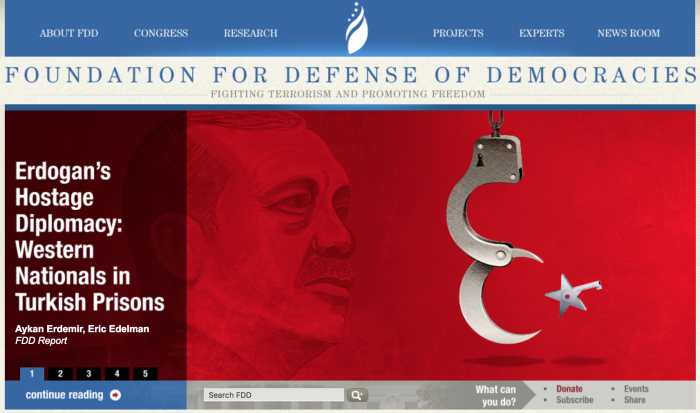A Washington think tank has warned that Turkish President Recep Tayyip Erdoğan is holding a number of Western nationals in jail to use them as “bargaining chips” against their countries in what they called “hostage diplomacy.”
A 36-page report released on June 1 and titled “Erdogan’s Hostage Diplomacy – Western Nationals in Turkish Prisons” by the Foundation for Defense of Democracies (FDD) said more than 30 Western nationals have been jailed in Turkey since a military coup attempt on July 15, 2016.
At least nine of them remained in prison as of June 1, 2018, noted the report, co-authored by FDD fellows Eric Edelman, a former US ambassador to Turkey, and Aykan Erdemir, a former opposition Republican People’s Party (CHP) deputy in the Turkish Parliament.
Ankara’s jailing of foreigners on political grounds on accusations ranging from espionage and propaganda to membership in the outlawed Kurdistan Workers’ Party (PKK) and the Gülen movement has added to the deterioration of ties with its NATO allies.
“Not only did authorities begin to target Western human rights advocates, an attempt to intimidate Turkish dissidents who collaborate with foreign colleagues, but Turkey’s pro-government media also launched a slander campaign against Europeans and Americans, accusing them of supporting terrorism and conspiring coups to make them into targets for the mass crackdown,” FDD report said.
It cited the cases of two Americans, pastor Andrew Brunson and Serkan Gölge, a Turkish-American physicist who worked for NASA’s Mars program until the Turkish police arrested him in 2016 while on vacation in Turkey as notable examples of hostages.
“Increasingly, another aspect of these mass arrests has emerged: Since last summer, American and European officials have on several occasions condemned Turkey’s ‘hostage diplomacy’ – efforts by the Turkish government to make political bargaining chips out of Western prisoners arrested in Turkey since the coup. Following the arbitrary detention of Western nationals in Turkey, they argue, the government uses the prisoners as pawns to extract concessions in bilateral relations with the US and EU countries,” said the FDD report.
“As one Freedom House analyst observed, ‘Turkey’s new foreign policy is hostage-taking.’ Indeed, as President Erdogan turned increasingly autocratic at home, Turkey’s international reputation and relations with its traditional transatlantic partners have also frayed.”
Brunson’s continued detention for alleged membership in the PKK and Gülen movement has angered the Trump administration and the US Congress. President Donald Trump has repeatedly urged the pastor’s release as Congress threatens sanctions on the Erdoğan regime that could affect its military procurement, including the purchase of F-35 Joint Strike Fighters.
Turkish President Erdoğan himself implied the release of Brunson by exchanging him for US-based Turkish Muslim scholar Fethullah Gülen, who he holds responsible for mounting the coup and whose extradition he has sought from the US.
“‘Give us the pastor back,’ they say. You have one pastor as well. Give him [Gülen] to us,” Erdoğan said in September 2017. “Then, we will try him [Brunson] and give him to you.”
“The harshest denunciations of Ankara’s hostage diplomacy, however, have come from the United States Congress, where members have issued multiple calls for imposing sanctions against Turkish officials involved in the wrongful arrests of American citizens. The arrest of Brunson on dubious charges, in particular, has animated Washington, where Congress has held numerous panels and hearings on the pastor’s Kafkaesque case and the conditions of his confinement. Meanwhile, authorities have arrested at least three Turkish employees of US consular missions in Turkey, prompting a visa crisis between the NATO allies in late October 2017. While the crisis was ostensibly resolved by December the same year, all three employees remain in prison or under house arrest,” the report added.
Earlier this year, Czech media reported that Ankara had offered Prague an exchange of two of its citizens imprisoned in Turkey for Salih Muslim, the former co-leader of a US-allied Syrian Kurdish party who Czech authorities detained for several days at the behest of the Erdoğan administration.
Germany’s public-funded DW exposed a similar scenario regarding the case of Turkish-German journalist Deniz Yücel, who Erdoğan had on live TV vowed to keep in jail as long as he was president.
Yücel was released in February following a series of meetings between top German and Turkish officials, including both countries’ foreign and prime ministers.
“This hostage diplomacy is not only hurting Turkey’s global standing, but also propelling its transatlantic partners to consider sanctions against Ankara,” the report said, adding that “Germany and the United States have issued several travel warnings to their citizens, advising against visiting Turkey. Business communities and investors across Europe fear Turkey’s repressive climate and lack of fundamental human rights and freedoms. Turkey’s relations with the Netherlands unraveled in March 2017, after a diplomatic row ahead of the Dutch elections. While the main reason for the breakdown was Erdogan’s incitement of Turkish immigrants in the Netherlands, the deportations and detentions of dozens of Dutch citizens in Turkey did not help.”
Commenting on strategies employed by the US and EU countries in dealing with Erdoğan’s hostage diplomacy, the report said: “The United States and various European Union countries have so far dealt with Erdogan’s hostage diplomacy at the bilateral level, using discreet talks with Ankara to plead for the release of their nationals and employees. The Turkish president has chosen to bargain with each country according to his calendar, using his hostages as leverage to gain concessions. The US and the EU need a coherent, transatlantic strategy to counter Erdogan’s hostage diplomacy, not only to ensure the release of Western nationals in prison, but also to prevent other incidents in the future.”
(Stockholm Center for Freedom [SCF] with Turkish Minute)

